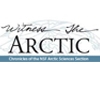
In an article published by Witness the Arctic, Dartmouth’s Lee McDavid writes about the range of outreach projects being conducted by fellows in Dartmouth’s Integrated Graduate Education and Research Traineeship (IGERT) program that focus on making science understandable to a range of audiences, including high school students studying science in Greenland, and four-year-olds at the Dartmouth Daycare Center.
IGERT, a program in polar environmental change, is funded by the National Science Foundation and run by Dartmouth’s Institute of Arctic Studies at the John Sloan Dickey Center for International Understanding, explains McDavid, the Arctic program manager. “While it is fundamentally an interdisciplinary curriculum in science, engineering, and the human dimensions of changing climate it also emphasizes science communication,” McDavid notes.
“For the past four years IGERT graduate students have been communicating with all sorts of unlikely audiences explaining properties of snow and ice, changes to the Greenland Ice Sheet, the composition of ice cores, the history of the earth’s climate, threats to coastal communities from melting ice, and complex Arctic policy issues as well basic science concepts, in the hope that science, engineering, environmental change, and the research process will be more understandable,” writes McDavid.
Ross Virginia, the Myers Family Professor of Environmental Science and director of the Institute of Arctic Studies, tells McDavid, “IGERT fellows learn to engage in different ways in order to improve their communication skills and to help increase the public’s understanding of science.”
Read the full story, published in the Fall 2013 edition of Witness the Arctic.
